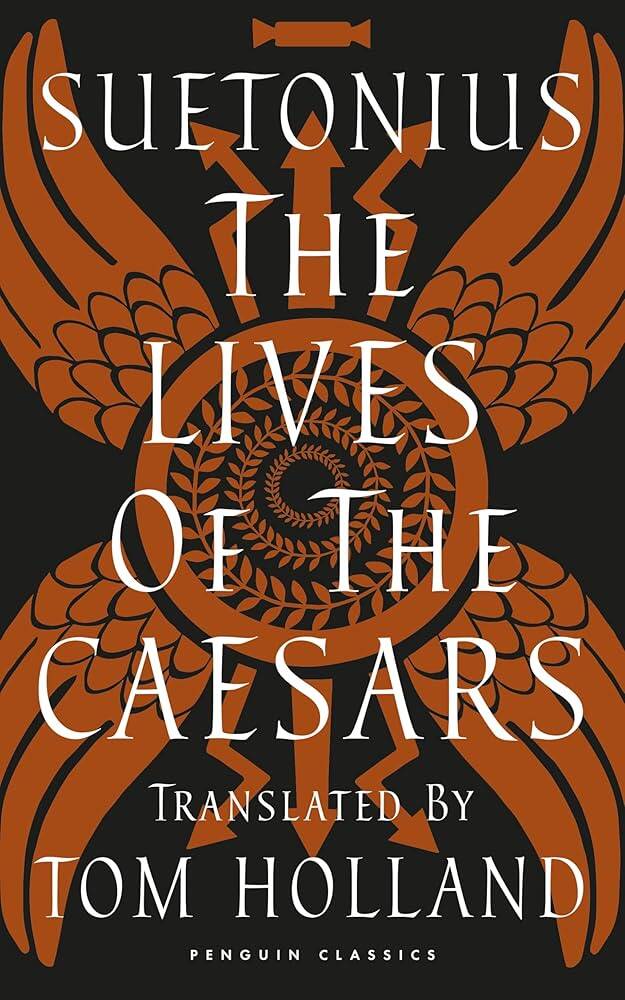Roman historian Suetonius wrote The Lives of the Caesars in the second century C.E., and it's full of gossip and scandalous rumors about Julius Caesar and the first 11 Roman emperors.

Penguin ClassicsThe cover of Tom Holland’s translation of Suetonius’ The Lives of the Caesars.
The Lives of the Caesars, a gossip-filled account of the lives of Roman emperors, has officially become a bestseller 2,000 years after it was originally written thanks to a new translation by Tom Holland, the co-host of the podcast The Rest Is History.
Originally penned by the scholar Suetonius, the book chronicles the drama-riddled lives of the first Roman emperors. There are 12 biographies in total, which cover the reigns of Julius Caesar and the 11 emperors who succeeded him. Holland describes the text as “ancient Rome’s Popbitch.”
“It is full of scandal, and extraordinary detail, but it is also very psychologically astute,” he told The Guardian. “It has the quality of a very highbrow gossip column.”
Notably, it is also the first hardback nonfiction book from Penguin Classics that has appeared on the bestseller list of the Sunday Times, marking a major achievement for the publisher. Regarding the book’s placement on the charts, Holland said he was “delighted for Suetonius, to see the lad is capable of getting on the bestseller list after two millennia.”
Why A Gossipy Roman Book Became A Bestseller 2,000 Years Later
It may seem strange that a second-century C.E. book about Roman emperors is landing on today’s bestseller charts, but there several reasons why people in 2025 are still fascinated by ancient Rome.
“We see the Caesars eat, drink, marry, divorce, get angry, make jokes, take exercise, urinate, listen to people break wind, tie up their sandals,” Holland wrote in The Times. “So scandalous are the details of their sex lives that entire paragraphs, in Victorian editions, might be reduced to asterisks. What happened at an emperor’s table or in his bedroom, Suetonius sought to demonstrate, was bound to inform what happened across the vast expanse of the empire.”

De Balie/Wikimedia CommonsTom Holland, the author and podcast host behind the new translation.
“He did not just stamp for ever the way that posterity would remember Caligula or Nero,” Holland continued, “he played a key role in ensuring that posterity would remember them in the first place.”
Holland’s piece in The Times draws many parallels between the scandalous lives and administrations of Roman emperors and modern politics. The author even suggests that Suetonius’ description of President Donald Trump would not be altogether different than how he distinctively portrayed the Caesars.
“Everyone instinctively knows what is being evoked: power, charisma, menace,” he wrote. “The Caesars, in the public imagination, are figures less of history than of gold-lit, shadow-haunted myth. One day, perhaps, the same will be said of Trump.”

Public DomainPresident Donald Trump’s inaugural portrait, 2025.
However, it isn’t just the current administration that invokes this comparison. The governing systems of the United States and much of the Western world are heavily derived from ancient Rome, and those echoes reverberate loudly even today.
Parallels Between Ancient Rome And The Modern United States Draw Fascination
“We feel closer to the Romans, perhaps, than we do to the Egyptians or the Assyrians,” Tom Holland noted when describing why people remain so interested in ancient Rome.
The American government is a republic, with elected officials meant to represent the desires of their constituents, a system that evokes ancient Rome and Greece. Before the national motto of the United States became “In God We Trust,” it was in Latin: “E pluribus unum” (“Out of many, one”).
There are countless comparisons to be made between the two nations, which could also play into some of the anxieties felt by modern Americans.

Andrea Ferrucci/Wikimedia CommonsA bust of Julius Caesar.
America’s republican system “was modeled on that of ancient Rome, but the [Roman] Republic ended up becoming an autocracy,” Holland said, “and so in America, there’s always been this anxiety that a Republican system of government may end up an autocracy, and I guess that at the moment, that anxiety has a particular salience.”
Even beyond the political sphere, though, Suetonius’ writing has remained fairly popular. People have always been drawn to sensational gossip and scandals — it’s the reason tabloids continue to exist. This new translation of Suetonius’ work may have sold the most copies, but that doesn’t discount how widely read it was in the past.
“Had there been bestseller lists in second-century Rome, Suetonius’ Lives of the Caesars would undoubtedly have been on them,” said Penguin Press’ Stuart Proffitt.
Holland’s translation was published on Feb. 13, 2025, and is available now from Penguin Classics.
After reading about Tom Holland’s new bestselling translation of The Lives of the Caesars, learn about ancient Rome’s worst emperors. Then, learn all about the salacious rumors regarding Julius Caesar’s bisexuality.





